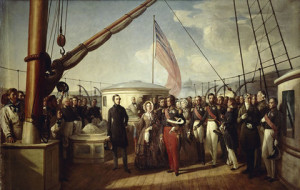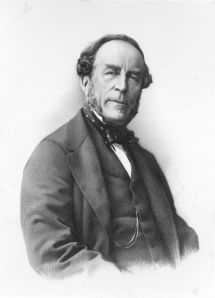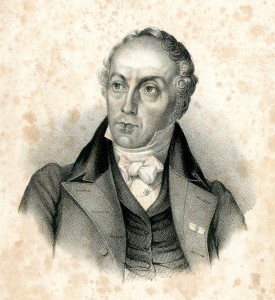 The first “entente cordiale” between France and England was brought about by a very strong symbolic gesture – Queen Victoria’s visit to King Louis-Philippe at the Château d’Eu in Normandy from the 2nd to the 7th of September 1843. She was the first British monarch to go to France since Henry VIII. This demonstration of friendship was even more remarkable as three years earlier, the two countries had been on the brink of war over the Far East question, public opinion then displaying strong feelings of resentment on both sides of the Channel. [Read more]
The first “entente cordiale” between France and England was brought about by a very strong symbolic gesture – Queen Victoria’s visit to King Louis-Philippe at the Château d’Eu in Normandy from the 2nd to the 7th of September 1843. She was the first British monarch to go to France since Henry VIII. This demonstration of friendship was even more remarkable as three years earlier, the two countries had been on the brink of war over the Far East question, public opinion then displaying strong feelings of resentment on both sides of the Channel. [Read more]
When, on October 11th 1832, François Guizot became the seventh Minister of Public Instruction of the July monarchy, he had for a long time been a recognised specialist of education issues. Since 1812, he had been professor of modern history at the Paris Faculty of Humanities, and even his most committed opponents agree that he was the greatest history professor of the first half of the XIXth century in France. Furthermore, with his future wife, Pauline de Meulan, he had founded in 1811 and edited for three years the Annales de l’Education, a monthly publication for families and schoolmasters wishing to receive information about ideas, methods and books necessary to educate children and pupils. [Read more]
 As soon as he entered the government in August 1830, Guizot endeavoured to embed the new regime in the continuity of national history, in order to strengthen its legitimacy. In his opinion, history could be a powerful force of social cohesion and sustain a need for national pride by illustrating the importance of France’s past. His ideas and his historical knowledge, recognised everywhere, placed him in an advantageous position to develop a sort of heritage policy, in the idea he expressed in 1828 that “it is a grave disorder and greatly weakens a nation if it forgets or disdains its past”. [Read more]
As soon as he entered the government in August 1830, Guizot endeavoured to embed the new regime in the continuity of national history, in order to strengthen its legitimacy. In his opinion, history could be a powerful force of social cohesion and sustain a need for national pride by illustrating the importance of France’s past. His ideas and his historical knowledge, recognised everywhere, placed him in an advantageous position to develop a sort of heritage policy, in the idea he expressed in 1828 that “it is a grave disorder and greatly weakens a nation if it forgets or disdains its past”. [Read more]
